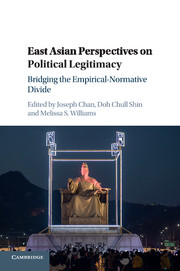Book contents
- Frontmatter
- Contents
- List of Contributors
- Preface and Acknowledgments
- 1 Political Legitimacy in East Asia: Bridging Normative and Empirical Analysis
- 2 Reasons to Obey: “Multiple Modernities” and Constructions of Political Legitimacy
- 3 Do East Asian States Enjoy a Legitimacy Premium?
- 4 Political Legitimacy in China: A Confucian Approach
- 5 Political Legitimacy in Hong Kong: A Hybrid Notion
- 6 The Evolution of Political Legitimacy in Singapore: Electoral Institutions, Governmental Performance, Moral Authority, and Meritocracy
- 7 Polarized Politics, Government Legitimacy, and Democratic Legitimacy in Taiwan
- 8 The Legitimacy of Democratic Rule in Korea: From the Perspective of the Mass Citizenry
- 9 Political Legitimacy, Satisfaction, and Japanese Democracy
- 10 Legitimacy as a Hybrid Phenomenon
- Index
1 - Political Legitimacy in East Asia: Bridging Normative and Empirical Analysis
Published online by Cambridge University Press: 30 December 2016
- Frontmatter
- Contents
- List of Contributors
- Preface and Acknowledgments
- 1 Political Legitimacy in East Asia: Bridging Normative and Empirical Analysis
- 2 Reasons to Obey: “Multiple Modernities” and Constructions of Political Legitimacy
- 3 Do East Asian States Enjoy a Legitimacy Premium?
- 4 Political Legitimacy in China: A Confucian Approach
- 5 Political Legitimacy in Hong Kong: A Hybrid Notion
- 6 The Evolution of Political Legitimacy in Singapore: Electoral Institutions, Governmental Performance, Moral Authority, and Meritocracy
- 7 Polarized Politics, Government Legitimacy, and Democratic Legitimacy in Taiwan
- 8 The Legitimacy of Democratic Rule in Korea: From the Perspective of the Mass Citizenry
- 9 Political Legitimacy, Satisfaction, and Japanese Democracy
- 10 Legitimacy as a Hybrid Phenomenon
- Index
Summary
INTRODUCTION
A political order enjoys legitimacy when its citizens or subjects have reason to believe that its claim to power is based on rightful authority, and its exercise of power can be justified according to accepted principles or norms. Political legitimacy is thus always a two-sided affair; intrinsically, it entails both empirical and normative dimensions. Understood from an empirical or sociological point of view, a state or regime is legitimate to the extent that its people accept its authority and see its actions as justifiable according to reasons they accept as valid. The normative dimension of legitimacy concerns the question of whether the norms by which the political order justifies its power ought to be regarded as valid norms. A state can enjoy sociological legitimacy without meeting coherent criteria of normative legitimacy. A state that can be rationally justified according to a particular conception of normative legitimacy may not be legitimate in the eyes of its people if they do not embrace the normative premises that underwrite this justification. To fully understand the dynamics of political legitimation in a given context requires attentiveness to both its empirical and normative aspects.
Yet despite repeated admonitions from scholars who study political legitimacy, most scholarly work on the concept tends to address its normative and empirical dimensions as separate enterprises. Political philosophers seek to identify the principles for evaluating the moral justifiability of political power. Empirical social scientists investigate the factors behind a people's acceptance or rejection of political elites’ claims to govern. Neither approach seems to be entirely satisfactory on its own. A purely normative approach that abstracts away from particular contexts in constructing an ideal theory of legitimacy is vulnerable to the challenge that it has little practical relevance. Legitimacy is about power relations between rulers and ruled; surely a consideration of the reasons that motivate agents in a particular order is relevant to evaluating the legitimacy of power relations in that order. Likewise, a social scientific approach that takes citizens’ statements of support for a state as indicators of political legitimacy has not shed much light on the state's legitimacy or illegitimacy if it has not also probed the normative principles according to which they believe the state's actions to be justified.
- Type
- Chapter
- Information
- East Asian Perspectives on Political LegitimacyBridging the Empirical-Normative Divide, pp. 1 - 24Publisher: Cambridge University PressPrint publication year: 2016
- 1
- Cited by



